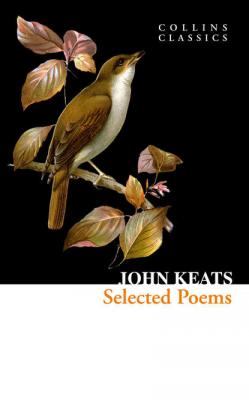ТОП просматриваемых книг сайта:
Selected Poems and Letters. John Keats
Читать онлайн.Название Selected Poems and Letters
Год выпуска 0
isbn 9780007558117
Автор произведения John Keats
Жанр Поэзия
Издательство HarperCollins
The downcast eye, repentant of the pain
That its mild light creates to heal again:
E’en then, elate, my spirit leaps, and prances,
E’en then my soul with exultation dances
For that to love, so long, I’ve dormant lain:
But when I see thee meek, and kind, and tender,
Heavens! how desperately do I adore
Thy winning graces; – to be thy defender
I hotly burn – to be a Calidore –
A very Red Cross Knight – a stout Leander –
Might I be loved by thee like these of yore.
II.
Light feet, dark violet eyes, and parted hair;
Soft dimpled hands, white neck, and creamy breast,
Are things on which the dazzled senses rest
Till the fond, fixed eyes, forget they stare.
From such fine pictures, heavens! I cannot dare
To turn my admiration, though unpossess’d
They be of what is worthy, – though not drest
In lovely modesty, and virtues rare.
Yet these I leave as thoughtless as a lark;
These lures I straight forget, – e’en ere I dine,
Or thrice my palate moisten: but when I mark
Such charms with mild intelligences shine,
My ear is open like a greedy shark,
To catch the tunings of a voice divine.
III.
Ah! who can e’er forget so fair a being?
Who can forget her half retiring sweets?
God! she is like a milk-white lamb that bleats
For man’s protection. Surely the All-seeing,
Who joys to see us with his gifts agreeing,
Will never give him pinions, who intreats
Such innocence to ruin, – who vilely cheats
A dove-like bosom. In truth there is no freeing
One’s thoughts from such a beauty; when I hear
A lay that once I saw her hand awake,
Her form seems floating palpable, and near;
Had I e’er seen her from an arbour take
A dewy flower, oft would that hand appear,
And o’er my eyes the trembling moisture shake.
Isabella; or, The Pot Of Basil
A Story from Boccaccio
I.
Fair Isabel, poor simple Isabel!
Lorenzo, a young palmer in Love’s eye!
They could not in the self-same mansion dwell
Without some stir of heart, some malady;
They could not sit at meals but feel how well
It soothed each to be the other by;
They could not, sure, beneath the same roof sleep
But to each other dream, and nightly weep.
II.
With every morn their love grew tenderer,
With every eve deeper and tenderer still;
He might not in house, field, or garden stir,
But her full shape would all his seeing fill;
And his continual voice was pleasanter
To her, than noise of trees or hidden rill;
Her lute-string gave an echo of his name,
She spoilt her half-done broidery with the same.
III.
He knew whose gentle hand was at the latch,
Before the door had given her to his eyes;
And from her chamber-window he would catch
Her beauty farther than the falcon spies;
And constant as her vespers would he watch,
Because her face was turn’d to the same skies;
And with sick longing all the night outwear,
To hear her morning-step upon the stair.
IV.
A whole long month of May in this sad plight
Made their cheeks paler by the break of June:
“To-morrow will I bow to my delight,
To-morrow will I ask my lady’s boon.” –
“O may I never see another night,
Lorenzo, if thy lips breathe not love’s tune.” –
So spake they to their pillows; but, alas,
Honeyless days and days did he let pass;
V.
Until sweet Isabella’s untouch’d cheek
Fell sick within the rose’s just domain,
Fell thin as a young mother’s, who doth seek
By every lull to cool her infant’s pain:
“How ill she is,” said he, “I may not speak,
And yet I will, and tell my love all plain:
If looks speak love-laws, I will drink her tears,
And at the least ’twill startle off her cares.”
VI.
So said he one fair morning, and all day
His heart beat awfully against his side;
And to his heart he inwardly did pray
For power to speak; but still the ruddy tide
Stifled his voice, and puls’d resolve away –
Fever’d his high conceit of such a bride,
Yet brought him to the meekness of a child:
Alas! when passion is both meek and wild!
VII.
So once more he had wak’d and anguished
A dreary night of love and misery,
If Isabel’s quick eye had not been wed
To every symbol on his forehead high;
She saw it waxing very pale and dead,
And straight all flush’d; so, lisped tenderly,
“Lorenzo!” – here she ceas’d her timid quest,
But in her tone and look he read the rest.
VIII.
“O Isabella, I can half perceive
That I may speak my grief into thine ear;
If thou didst ever any thing believe,
Believe

